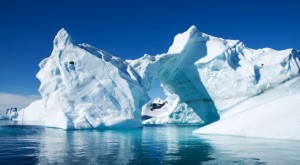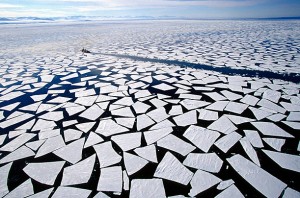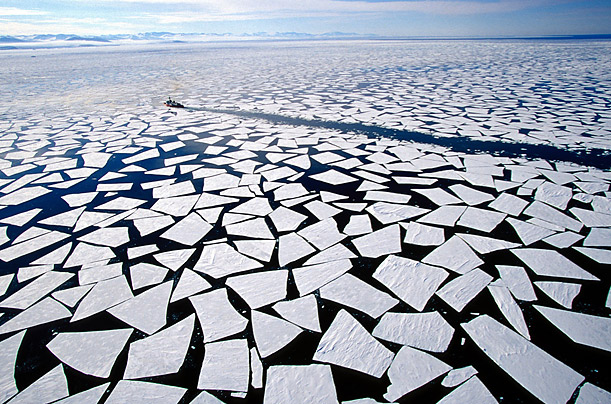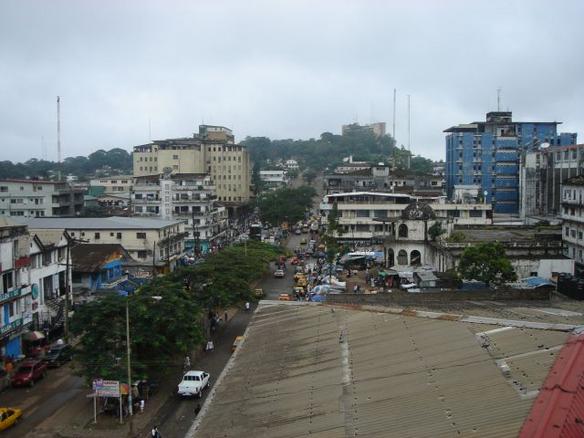 It is projected that over the course of this century, the average global temperature will rise between 1-4°C. The most noticeable effect of climate change is occurring in the Arctic, where warmer summers mean record lows for ice spread and in the foreseeable future, ice-free summers at the North Pole. Should the trend indeed persist, it will translate to political and commercial interest for systemic development of the resources the Arctic has to offer.
It is projected that over the course of this century, the average global temperature will rise between 1-4°C. The most noticeable effect of climate change is occurring in the Arctic, where warmer summers mean record lows for ice spread and in the foreseeable future, ice-free summers at the North Pole. Should the trend indeed persist, it will translate to political and commercial interest for systemic development of the resources the Arctic has to offer.
Energy resources are among the most attractive, not just because of the new accessibility afforded through the melting ice, but also because the Arctic is among the most geopolitically stable areas and is far away from volatile critical regions, such as the Middle East. Off-shore drilling is going to be one of the main activities we will see develop in the Arctic Ocean with the added implication that they will still operate within one of the most dangerous areas of the world. Annual ice formation often lasts 6-7 months and would pose incredible environmental risks to the operations of sea-based oil platforms. A technological solution would be needed to ensure that ice floes do not become the cause of an oil spill of a massive scale, which would in turn be the reason for long-term environmental damage.
Another aspect that will facilitate the industrialization of the Arctic is that less ice and longer ice-free periods will make shipping more economical. The construction, supply and maintenance of off-shore oil rigs is done through specifically equipped vessels, whose tasks will be made more difficult, since the summer months offer the only window for sustained construction. In the other seasons, sea ice and ice floes mean that vessels and construction components must be reinforced to operate under the enormous pressures the ice would exert, but also in the extreme negative temperatures.
Additional challenges for exploiting the energy resources of the Arctic come from the number of interested parties. With lagging economic performance and cash-strapped budgets, government are going to welcome foreign direct investment to carry out feasibility studies, invest in the rig and the infrastructure, as well as ensuring that the investment benefits the regional communities. The most likely forms of partnership are joint company ventures, or public-private initiatives between national governments and private enterprises. Investment from China (e.g. the purchase of Nexen by CNOOC) will be increasingly important for the proper development of the Arctic, not just because Chinese companies dispose of enough capital for the purpose, but also because these links would open the Chinese market for Western economies further.
The picture that emerges is that the Arctic is going to introduce unique and extreme challenges to any proposed off-shore construction projects. The management of these challenges on the policy level would mean building framework around stringent environmental standards and enforcing them effectively. Multiple partners from different countries outside the Arctic Circle are also going to express interest to participate, but this interest must be evaluated against national, security and commercial interests and controlled accordingly.
Among the highest risks that off-shore oil and gas platforms pose is a spill, akin to the one that happened with the Deep Horizon disaster in the Gulf of Mexico in the spring of 2010. Technological failure was blamed for the human casualties of the incident, as well as the billions of dollars of environmental damage to the marine and coastal ecosystems of the gulf. The negative impacts on the environment also reverberated economically, as the tourism and fishing industries in communities along the southern states and Mexico suffered in the aftermath of the spill. If such a disaster occurred in the Arctic, the consequences would be far costlier, because the remoteness of the region and its extreme conditions would make any contingency plan forbiddingly expensive, and even more so if a technological failure resulting in a massive spill takes place in wintertime.
Shipping increases the risk many times, because oil tankers, support vessels and cruise ships are not immune to accidents, despite the preventive solutions, such as dual-enforced hull design, being made industry standards. Events like the 1989 Exxon Valdez incident, or the Costa Concordia in 2011, show that advanced technology cannot prevent an accident from occurring. In the Exxon Valdez disaster, millions of gallons of petroleum spilled into the ocean and siphoned into the Alaska coastline. Despite the massive effort to clean up the area, it is still not fully recovered. The Costa Concordia ran aground in 2011 and rolled onto its side, half-submerged into the shallow water. Worries surfaced that untreated waste and fuel would leak into the Mediterranean from a hull rapture, as the ship was never designed to maintain its structural integrity while resting on its side.
An added implication to the twin risks of spills from ships or platforms is that the short summer of the Arctic and the cold average temperature provide for a very small window in which its ecosystems can regenerate. In warmer climates, the higher average temperatures and longer growing seasons buoy the environments regenerative process, but warmer temperatures in the Arctic are unlikely to affect this process significantly. We must, then, consider that any accidental or intentional environmental damage will have long-term repercussions on the natural integrity of the region.

The Arctic Council is an advisory body, whose permanent members include the littoral states, as well as other intergovernmental and nongovernmental organizations concerned with indigenous affairs or sustainable development. The Council does not have binding power, but much of the work it does concerns how to properly manage the environment of the Arctic, so as to minimize the footprint of industry and provide sustainable community development at the same time.
In conclusion, we might say that the analysis developed through the Arctic Council will be the basis for the regulatory frameworks that will control shipping and off-shore oil platform operations in the region. Nevertheless, we must be constantly cognizant of the risks and work towards their management for long-term sustainability.




